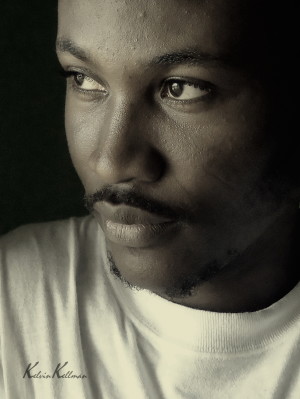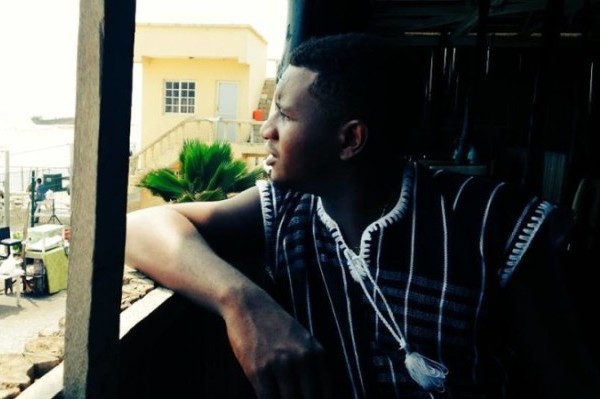It is not quaint, or a tongue-in-cheek affair when Ayodele Arigbabu, in his praise for Clinical Blues, said that we should “beware of medical doctors who moonlight as poet”—it does seem like a terrible mix!
One doesn’t expect someone in the medical profession to venture into poetry and act the orthodox. There is always something additional or missing—an X factor that characterizes Ajayi’s verse, making it smack of the unusual.
Clinical Blues, beyond the blitz of rhetoric, provokes profound musings, insightful prodding and comic comparison. These lines, for example, are unmistakably humorous: ‘Alice in the wonderland, / Alade in the hinterland,’? Or does one imagine sirens as the poet did through clinical lens in GRAFFITI TOO: ‘But sirens are road disinfectants/ For government land cruisers’?
***
LOVER
Clinical Blues is a personal chronicle of sorts, a testament etched on parchments collected in eighty-eight pages: a trusting lover who through a downturn of unrequited affection turned philosopher, and through his satori launched a living of wanton freedom from which a lifestyle of candor stems—as can be seen from the evolvement of the poems and voice
‘…But I’m a sucker for love
And you bear no orchids, Miss Blandish.
All you do is brandish your gorgeous 5’2
When I tell you
“I like you”.’
In the period where as expected, an answer, a response, should be gotten after leaving the comfort of his domain in quest for the pulse of his being personified, and there is none, the poet in a torrent of debacle, yet voices his dilemma:
‘…My soul calls,
The voice echoes,
And you do not answer.’
But this is not the height of it, because as a hopeless romantic which all true lovers are, he obsesses about his subject, associating her with images his fever-pitched imagination is in the habit of:
‘…Like your gait
The whole world has become a trap;
And you are bait.’
Like everything there is in this cosmos, an end comes—and sadly the end of the road for the poet; after perhaps sitting his love-struck self down in unbiased musings. Telling his heart the truth it was in denial of, accepting his fate—that this love—contrary to his prior thoughts, was not for his having:
‘My sun last shone when you left;
It has since been replaced by this
Placid moon, hanging rather badly
Like a wind-mangled, tree-snagged kite…
In the end,
There is no enchanting way
Of saying, “you
Took my sunshine away.”’
***
PHILOSOPHER
The poet comes to the realization that if everything else fails, as every genuine writer experiences, words are all that is left; all that they have. And so venturing into philosophizing we see bold declarations stemmed off personal ideations:
‘…Foolishness ‘…Pictures are no memories,
Is not only vice and virtue, They remain darkroom scams;
It is privileged feet not My mind surpasses every camera.’
Wearing shoes.’
In the light of such transition, the poet as it appears, goes renegade on form, life and all its inhibiting strictures. His voice afterwards highlights a blithe swelling that resonates with a possible lovelorn torture. Despite his playboy demeanor, an outright frankness follows. A paradox that borders on a Fela-esque disposition. A playboy, a preacher trumpeting the ills and vice of the human condition as he deems fit.
Playboy Trumpeter
‘…Baby, take off your cool, ‘…We live in a world that does not pause
Take a cue from my shredded garment. To mourn, everyone’s in a rush
I am wearing God’s image only. To board the next bus to tomorrow,
Be my mirror.’ Who falls short?’
In the course of this beautiful weave, we see moments of brilliant experimentation with word-play: “She raises homemade meals, / Cooks homemade children.” In “Portrait of a Poet, there is “Hemmingway,” but there is also “helming ways.”
Sometimes, however, attempts at experimentation do not work as well. Expressions like “dis-cord-ance,” “None. The. Less,” and the empty repetition of Oasis in “Love Songs” appear to be artless superfluity. These are moments when the poet goes too far, so far that he skids off the tangent of aesthetic.
In the journey through Clinical Blues, one cannot help but ask why the future takes the form of the testicle, or why the stainless pendulum of the grandfather clock must be a scrotum—leading one to wonder what the preoccupation of the poet is with sexual anatomy and orgasmic motif. Also, certain lines in his work lack strong contextual clarity, which in today’s world might unsettle certain ilk pulsing with ultra-feministic zeal.
As with most works of art, everyone has their moment of ecstasy, and for me mine came with these:
‘…Thereafter, let me hold you
Tight like a bodice,
Let’s take off caution
Like our clothes and dive
Nose-deep into the deep reaches of
Passion…’
*******
About the Author:
 Kelvin Kellman is a Nigerian Poet and writer who writes from Ile-Ife. He has a collection of poetry coming out later in the year.
Kelvin Kellman is a Nigerian Poet and writer who writes from Ile-Ife. He has a collection of poetry coming out later in the year.










Lover−Philosopher, Playboy−Trumpeter | Review of Dami Ajayi’s “Clinical Blues” | Kelvin Kellman – Dami Ajayi July 11, 2022 03:43
[…] Read more at Brittle Paper […]